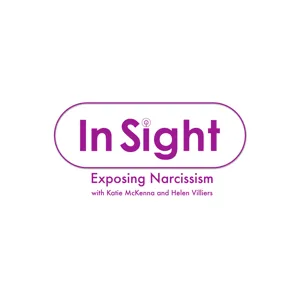Podcast Summary
Understanding Relationships with Narcissistic Parents: The new cookbook 'You're Not the Problem' by Pinch of Nom reminds us that we're not to blame for issues in relationships with narcissistic parents and it's not our fault we learned unhealthy patterns.
The new cookbook by Pinch of Nom, titled "You're Not the Problem," aims to help people understand that they are not to blame for issues in their relationships, particularly those with narcissistic parents. The authors, Katie McKenna and Helen Villas, have seen many clients who felt they were the problem due to manipulation by their parents. The book's name is meant to remind readers that they are not the cause of relationship issues and that it's not their fault they had to learn unhealthy patterns. The authors dropped hints about the book's title throughout their podcast episodes, but no one guessed it. They also shared some creative and funny suggestions from listeners. The Facebook group, Insight Exposing Narcissism, is a supportive community for those dealing with narcissistic relationships. The authors will be discussing the book in full with their Patreons on the following Tuesday night.
Author shares excitement over book release: Pre-orders are crucial for authors and publishers, covers are important aspects of a book's identity, and personal celebrations can add to the excitement of a book launch
The release of a book is an exciting and anticipated event for both the author and the readers. Pre-orders play a significant role in the publishing process and are appreciated by authors. The covers of the book are important aspects of the book's identity and are usually shared with the audience. Personal connections and celebrations can add to the excitement of the book launch. The author in this conversation shared her experience of her upcoming book release, including the importance of pre-orders, the excitement over the covers, and the fun she had during her birthday weekend celebrating with friends and family.
Maintaining Autonomy and Open Communication in Relationships: Be authentic, express needs, respect autonomy, and foster open communication for healthy and fulfilling relationships.
Autonomy and open communication are crucial for healthy relationships. The speaker emphasized the importance of being true to oneself and expressing one's needs while respecting others' autonomy. She shared an experience where she suggested changing dinner plans and her friends responded with their own autonomy, leading to a successful outcome. The speaker also highlighted the negative consequences of not expressing one's needs and the importance of calling each other out in relationships. Overall, the discussion underscores the significance of maintaining boundaries, being authentic, and fostering open communication in fostering healthy and fulfilling relationships.
Acknowledging apologies: Accepting apologies graciously promotes healthy relationships and sets an example for forgiveness. Consider the reason behind uncomfortable responses and practice forgiveness to create a positive environment.
When someone apologizes, it's important to acknowledge their apology and accept it graciously, even if the offense seemed small. This not only helps maintain healthy relationships but also sets an example for children growing up in such environments where apologies and forgiveness are normalized. However, sometimes the person apologizing may feel uncomfortable with the apology or deny the offense altogether. In such cases, it's crucial to consider the reason behind their response and whether they're trying to rescue your discomfort or if they're genuinely uncomfortable with the apology. By standing in our truth and acknowledging the apology, we can move past the offense and promote healthy communication. Additionally, our response to apologies can impact how we respond to our own mistakes and the mistakes of those around us. By practicing forgiveness and accepting apologies, we can create a more positive and understanding environment.
Moving on in Healthy Relationships: Forgiveness isn't Required: Effective communication, conflict resolution, and seeking therapy are crucial for healthy relationships. Forgiveness isn't necessary, but respectful and productive discussions are.
Forgiveness is not a requirement for moving on in healthy relationships. Conflict resolution is crucial, but it must be handled with care and respect. Anger can be a healthy emotion when expressed in a non-hurtful way, and it can lead to growth and better communication. However, some behaviors, like walking away during arguments or using the term "trigger" to shut down discussions, can be invalidating and unhelpful. It's essential to communicate openly and find a healthy way to address issues, even if it means deciding to end the relationship if the conflict cannot be resolved in a respectful and productive manner. The letter discusses a listener's experience with her husband's concerning communication patterns and the importance of seeking therapy and learning effective communication skills.
Effective communication and understanding triggers in relationships: Recognize triggers are common and approach conversations with empathy and understanding, avoiding accusatory language. If one partner refuses to address their triggers, consider if the relationship is sustainable.
Effective communication and understanding triggers are crucial in maintaining a healthy relationship. However, when one partner consistently reacts defensively and is unwilling to work on their triggers, it can lead to exhausting and unproductive conflict. The speaker in this discussion has an anxious attachment style and has worked hard to address her own triggers, but finds herself at a loss when dealing with her partner's constant triggers. It's important to recognize that triggers are not unique to one person and can affect anyone. To manage triggers, it may be helpful to approach conversations with empathy and understanding, avoiding accusatory language and instead focusing on expressing feelings and needs in a clear and respectful way. If one partner consistently refuses to engage in therapy or counseling to address their triggers, it may be necessary to consider whether the relationship is sustainable in its current form. Communication and understanding are key, but both partners must be willing to put in the effort to build a healthy and fulfilling relationship.
Understanding Triggers in Relationships: Triggers are emotional responses to past traumas, making communication and conflict resolution challenging. Recognizing and addressing underlying emotions can lead to healthier relationships.
Triggers are not an excuse to avoid communication or accountability in relationships. They represent emotional flashbacks to past traumas, causing a physiological response that can make it difficult to process criticism or handle conflict. However, it's crucial to manage these feelings instead of shutting down conversations. A trigger is an emotional response to a perceived threat, and it's essential to recognize and address the underlying emotions to foster healthier communication. Ultimately, understanding triggers can help us develop more empathetic and resilient relationships.
Childhood experiences shape our reaction to 'no': Childhood emotional distress or unsafe environments can lead to emotional triggers linked to feelings and sensations, affecting our response to the word 'no'.
Our inability to say "no" and the resulting physical reactions could be rooted in childhood experiences where saying "no" led to emotional distress or feelings of unsafe environment. This emotional memory, which is predominantly stored before the age of 2.5 when picture memory starts to develop, can manifest as triggers or emotional flashbacks. These emotional responses, rather than being tied to specific images or events, are linked to feelings and sensations. Children who are labeled as "difficult" or punished for expressing their needs may develop emotional triggers related to the use of the word "no." The memories of such experiences are not processed in the same way as memories from a healthy upbringing, leading to fragmented or unprocessed memories stored primarily in the body. The amygdala responds to emotional threats in the same way it does physical threats, and emotional safety is just as important as physical safety for a child's development. Understanding this connection can help individuals recognize and work through their emotional triggers.
Recognizing and coping with emotional flashbacks: During emotional flashbacks, name emotions, stay present, and avoid suppressing feelings to foster emotional connections and personal growth.
During an emotional flashback, a person may feel disconnected from the present and overwhelmed by intense emotions, often rooted in past experiences. This can lead to feelings of unlovability, fear, and even suicidal ideations. Stonewalling, a behavior where a person ignores or dismisses their partner's emotions, can worsen the situation by preventing emotional connection and deepening feelings of isolation. It's crucial to recognize and name the emotions, especially shame, during emotional flashbacks and to keep one foot in the present to avoid being fully consumed by the past. Emotional experiences are essential for connecting with others, and suppressing emotions can hinder relationships and personal growth.
Fear of shame can hinder healthy boundary setting: Acknowledge and address the fear of shame to maintain healthy relationships, as denying emotions and refusing to engage in discussions can lead to emotional abandonment and hinder growth.
Fear of shame can prevent us from setting healthy boundaries. During a discussion in a Facebook group, someone shared a post about their struggle with managing boundaries and the fear of emotions that come with it. Many people identified the fear of shame as the root cause, which stems from a deep-seated belief that saying no or putting oneself first makes one unlovable or a bad person. This fear leads to avoidance behaviors and a denial of emotions, making it essential to acknowledge and address these feelings to maintain healthy relationships. Moreover, dismissing someone's emotions and refusing to engage in discussions about feelings can be a form of emotional abandonment. In a romantic relationship, this behavior denies the partner's experience of the world and hinders growth. By not sharing thoughts and feelings and actively listening, one partner is shutting down the other, using their triggers to silence them, and prioritizing their own emotions over their partner's. It is crucial to approach relationships as a constant negotiation and growth process, where both parties are encouraged to express their emotions and work together to maintain a safe and healthy environment.
Emotional Neglect as a Form of Abuse: Recognize emotional neglect as damaging and harmful, avoid manipulative tactics, communicate assertively, set boundaries, and take steps to address it for self-esteem and well-being.
Neglect can be a form of emotional abuse. In the discussion, it was highlighted that a partner's refusal to meet emotional needs, devaluing, and shutting down communication can be damaging and abusive. The use of punishment, such as showing affection to others in front of the neglected person, is a manipulative tactic that can further harm the relationship. The listener's efforts to improve communication and spend quality time together were met with resistance, blame, and deflection. The speaker commended the listener's communication style but also acknowledged the need for assertiveness and setting boundaries. The wrong thing to say in this situation was suggesting a time to connect, which led to a negative reaction and withdrawal from the partner. It's essential to recognize the signs of emotional neglect and take steps to address it, as it can have long-term consequences on self-esteem and overall well-being.
Communication is key during disagreements: Clearly communicate if you need a break, avoid manipulative behaviors like stonewalling and giving the silent treatment, and trust that open communication will lead to a healthy resolution.
Communication is key in any relationship, especially during disagreements. It's important to understand that asking for a break and giving someone the silent treatment are two different things. If someone needs a break, they should communicate that clearly and return when they're ready. Stonewalling and giving the silent treatment are manipulative behaviors used to elicit fear and compliance from the other person. These behaviors are not acceptable in a healthy relationship. It's crucial to trust that if you communicate your needs and give someone space, they will come back to you with respect and a willingness to repair the relationship. If someone consistently stonewalls or gives you the silent treatment, it may be a sign that they don't prioritize your relationship or value your feelings. It's essential to set boundaries and prioritize your emotional well-being. Remember, communication is a two-way street, and both parties must be willing to listen, understand, and respect each other's needs.
Recognizing Manipulative Tactics in Relationships: Understand manipulative tactics like the silent treatment and gaslighting can stem from past abuse and are damaging, not accept them in relationships, prioritize communication and respect for healthy partnerships.
Some people may use manipulative tactics, such as the silent treatment or gaslighting, to assert dominance and control in relationships. This behavior can stem from past experiences of psychological abuse, particularly during childhood. These tactics are damaging and can create a pattern of abuse, where the person being manipulated is made to feel like the problem instead of the abuser. It's important to recognize these behaviors and not accept them in a relationship. Communication and mutual respect are key to building healthy and fulfilling partnerships.
Understanding Gaslighting and its Repercussions: Gaslighting involves manipulation, denial, dismissal, deflection, minimizing, and disregard, leading to victim's silence and shame. Reactive abuse like criticism can further harm, but constructive criticism fosters growth.
Gaslighting is a form of emotional manipulation involving denial, dismissal, deflection, minimizing behavior, and disregard. It can lead individuals to react in ways they wouldn't normally, such as shouting or physical abuse. This reaction, known as reactive abuse, can further silence and shame the victim, reinforcing the gaslighter's control. Criticism, a form of reactive abuse, can be particularly damaging as it erodes the victim's self-worth. Constructive criticism, on the other hand, helps individuals grow. Understanding these dynamics can help victims recognize and challenge gaslighting behaviors and reclaim their power in relationships.
Recognizing patterns of defensiveness and stonewalling in relationships: Effective communication and emotional connection are vital in relationships, but defensiveness and stonewalling can hinder these elements. Be aware of these behaviors and strive for open, honest, and empathetic communication to maintain a healthy bond.
Effective communication and connection are crucial in maintaining healthy relationships. However, some patterns of behavior, such as defensiveness and stonewalling, can hinder these essential elements. The words "we need to talk" can trigger fear and defensiveness, especially for those with a trauma history. Defensiveness can take the form of denial, justification, or victimization, which ultimately silences the other person. Stonewalling involves shutting down and refusing to connect, disconnecting through body language or emotional withdrawal. Both behaviors disrupt the emotional connection that keeps relationships thriving. It's essential to recognize these patterns and work towards open, honest, and empathetic communication to foster a healthy and lasting bond.
Recognizing Unhealthy Relationship Patterns: Unhealthy relationships involve constant triggers, disrespect, and unequal emotional effort. Recognize and address these patterns for a successful and equal partnership.
Being in a relationship with someone who constantly triggers you and refuses to work on their triggers is not sustainable or healthy. It's important to recognize that you are not responsible for someone else's emotional well-being or the state of the relationship. Contempt, which involves treating someone with disrespect and making them feel worthless, is a major indicator of an unhealthy and potentially divorce-worthy relationship. The key to a successful and equal relationship is mutual effort in repairing any ruptures or disagreements, recognizing that both parties are equal and have an equal responsibility to make things right. If only one person is carrying the emotional weight, it creates an unfair and unhealthy dynamic. The speaker's anger towards the man's behavior towards the woman in the letter highlights the importance of recognizing and addressing these unhealthy patterns in relationships.
Identifying Emotional Abuse: Recognize controlling behavior and conditional love as signs of emotional abuse. It's not your responsibility to fix your partner, and attempting to manage his behavior is exhausting and emotionally abusive. Use the right vocabulary and language to identify abuse and seek healthier relationships.
Emotional abuse can manifest in various ways, including controlling behavior and conditional love. This form of abuse can be exhausting and unfair, and it's important to recognize it for what it is. The speakers emphasized that it's not the listener's responsibility to fix her partner, and attempting to manage his behavior and reactions is not only exhausting but also emotionally abusive. They urged listeners to use the vocabulary and language to identify emotional abuse and understand that they deserve better in relationships. The speakers' goal is to empower individuals by naming the abuse and offering them the tools to make difficult but necessary choices towards healthier relationships.
The importance of a supportive team for personal growth and success: Surround yourself with a supportive team that fosters clear communication, accountability, and growth.
The power of a supportive team can lead to personal growth and success. Both Katie and Rosh shared their hopes for their upcoming project and expressed their excitement about the level of support they've received. Katie revealed her realization that she doesn't work well in toxic teams but thrives in healthy, accountable ones. Rosh acknowledged Katie's straightforwardness and impulsiveness as strengths rather than weaknesses. They both emphasized the importance of clear communication and accountability in their team dynamics. Ultimately, they highlighted the importance of surrounding oneself with people who bring out the best in each other and create an environment that fosters growth and success.
Importance of open communication and collaboration: Effective communication and collaboration lead to meeting everyone's needs and achieving amazing results.
Learning from this podcast is the importance of open communication and collaboration. The speakers emphasized that everyone's needs will be met if they express them clearly. They also highlighted the success of their project, which was built on the foundation of working together and putting each other's needs first. They encouraged listeners to order their book and thanked their sponsors and listeners for their support. Ultimately, the message was one of unity and taking care of each other. It's a reminder that when we work together and communicate effectively, we can achieve amazing things. So, go out there and express your needs, and watch as the community comes together to support and uplift each other. Thank you for tuning in, and we'll see you next time. This podcast has been edited by Sam Atkinson, whose link is in the bio.





